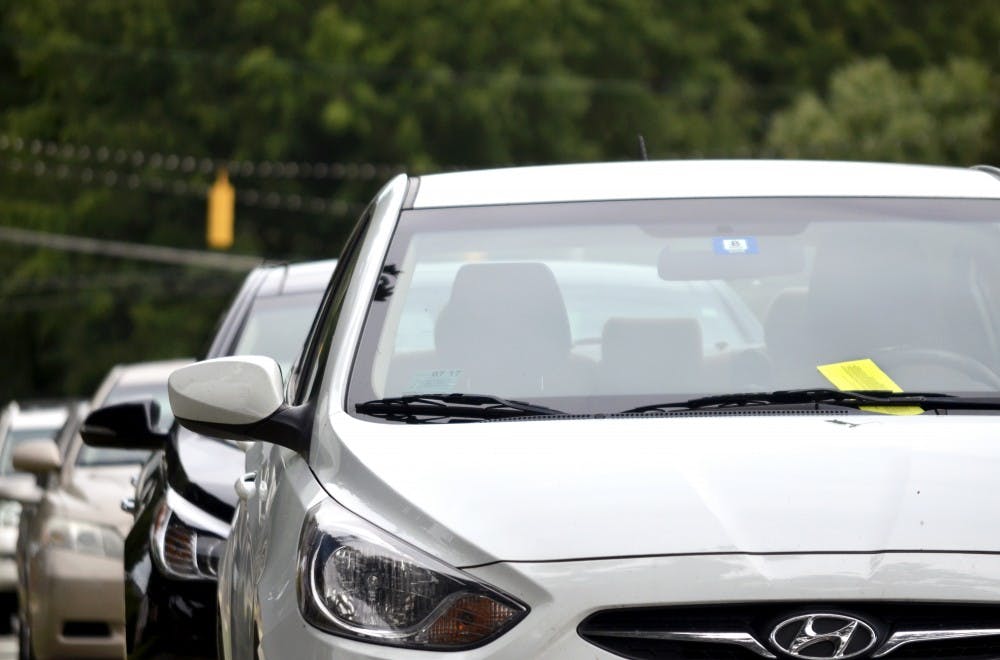Elon University has 5,390 parking spaces — according to University Architect and Director of Planning, Design and Construction Management Brad Moore, that is more than enough.
In 2016, the Town of Elon's governing board, the Board of Aldermen, added a university clause to their parking regulations which would have required Elon to construct an additional 1,000 parking spaces. Moore went before the Board of Alderman in August to present the university's perspective and ask that the board amend their plan to require one parking spot for each faculty member and one spot for each two students.
This regulation was based on square footage. One space was required per every bedroom in residential buildings (dormitories) and one space for every 500 square feet of non-residential buildings.
"For the last several years, our square footage has been growing faster than our population," Moore said. "As we already have spaces on campus that are not being used, continuing to build parking spaces based on new square footage would require us to build more even more spaces that would not be used."
Moore successfully convinced the Board of Aldermen to amend the requirements, but students have expressed doubt that more parking is not unnecessary.
After Moore's presentation last month, senior Brianna Balady asked Elon News Network, "Considering Elon's acceptance rate grew so much our university couldn't fit all the students on campus housing, why wouldn't Elon allot more spaces for these students to park? Where are off-campus students supposed to park if we don't even have spaces to park for on-campus students during the day?"
According to Moore, it is difficult to determine how many spots are reserved for faculty and staff members and how many our available to students. From there, it is difficult to determine how many parking spaces are available to the various types of permits because some parking lots are open to numerous types of permits.
1,900 parking permits have been issued so far this semester according to the Chief of Campus Safety and Security, Dennis Franks.
Junior Meaghan McCann said she parks her car in front of her off-campus apartment and rides her longboard to class to avoid having to find a parking spot.
"On-campus I feel like there is not a lot of parking for students, there's always the staff parking areas," McCann said. "For people who live much further away ... I cannot imagine the parking struggle."
One member of the Board of Aldermen, Town of Elon Mayor Jerry Tolley, former head coach of the Elon football team, said he has never experienced a parking "struggle," but acknowledged students might.
"When I drive through campus ... never have trouble finding a parking space," said Town of Elon Mayor Jerry Tolley, former head coach of the Elon football team. "The faculty and staff, students — maybe, but the faculty and staff always have somewhere. ... That lot down by the East Gym was hardly ever used and it was a block from campus."
Tolley said parking will always be a point of contention.
"Parking on every college campus will always be a situation you have to deal with," Tolley said. "The only way you won't have to deal with it, is if enrollment decreases, and I don't think we want a decline in our number of students."
Tolley pointed out there is parking available on Trollinger Street and Lebanon Avenue not reserved for students, but these spots are assigned time limits — 20 minutes and two hour parking only.
Because Town of Elon ordinances do not allow drivers to move their cars from one space in a row to another to avoid a parking ticket, students may have trouble using these spots for parking during classes. Very few classes at Elon last less than two hours. As a result, many neon green parking tickets can be seen adorning cars along the road.
During his presentation, Moore told the Board of Aldermen that the previous parking regulations was not only fiscally, but environmentally irresponsible, too.
"This is not an environmentally sustainable practice because these parking lots reduce green space, increase impervious surface, create more heat islands, etc," Moore said.
Vice President for Student Life and Dean of Students, Jon Dooley, emailed students on Sept. 1 a reminder about alternative transportation options made available by "campus sustainability efforts."
These alternatives include the BioBus and the Share the Ride NC program.


